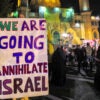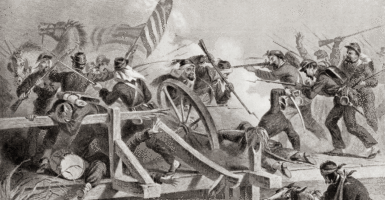Visit a major Civil War battlefield, and chances are you will see stone monuments speckled amid the quiet and green fields and glens that form these hallowed places.
These monuments are somber memorials to regiments and brigades, and ultimately, to the soldiers who fought, bled, and died on these fields. Tallies of dead and wounded are inscribed on many monuments.
Perhaps the most powerful memorial to these soldiers, however, is not a monument of stone. You will not find it on a battlefield, but in a letter Major Sullivan Ballou, a Union Army officer in the 2nd Rhode Island Infantry, wrote to his wife, Sarah, on July 14, 1861.
“I know I have but few claims upon Divine Providence, but something whispers to me, perhaps it is the wafted prayer of my little Edgar, that I shall return to my loved ones unharmed,” Ballou wrote. “If I do not, my dear Sarah, never forget how much I love you, nor that, when my last breath escapes me on the battle-field, it will whisper your name.”
Shortly after Ballou wrote his letter (you can read his full letter here), the first major land battle of the American Civil War—the First Battle of Bull Run—raged outside the normally tranquil town of Manassas Junction, Virginia, which today is Manassas, 160 years ago on July 21, 1861.
Chaotic and hard fought, Union and Confederate soldiers vied for high ground in the battle by advancing, retreating, and repelling one another, again and again. Eventually the Confederates seized and held the field and defeated Union forces.
Nearly 5,000 men were killed, wounded, or missing. Ballou was among the dead.
Even though Ballou’s letter was never mailed and so Sarah never read her husband’s last wishes, his words remind Americans today of the courage required to protect and preserve the United States.
Courage, the epitome of heroism, means doing the right thing even when it is hard. Torn between his love for family and nation, Ballou sets aside his attachment for the former to protect the latter.
In striking prose, he tells Sarah, “My love for you is deathless. It seems to bind me with mighty cables, that nothing but Omnipotence can break; and yet, my love of country comes over me like a strong wind, and bears me irresistibly on with all those chains, to the battlefield.”
Ballou understood that saving America—a country he loved—required making sacrifices.
“If it is necessary that I should fall on the battle-field for any country, I am ready,” he wrote. “I know how strongly American civilization now leans upon the triumph of government, and how great a debt we owe to those who went before us through the blood and suffering of the Revolution, and I am willing, perfectly willing to lay down all my joys in this life to help maintain this government, and to pay that debt.”
Ballou wrote his letter during the opening hours of what would become the darkest chapter of our nation’s history. The brutally fought Civil War cost America more than half a million lives.
From the 54th Massachusetts Infantry Regiment’s stand at the Battle of Olustee to the thousands of Union soldiers in the Army of the Potomac who repeatedly charged enemy breastworks at Fredericksburg, Virginia, soldiers showed a willingness to offer “the last full measure of devotion,” to quote Abraham Lincoln in his Gettysburg Address.
Sentinels of liberty embody this devotion, a virtue integral to America’s foundation and critical to preserving the U.S.
Although Ballou did not live to see the end of the Civil War, his words remind Americans today of the necessary sacrifices many like this sentinel made to hold our country on course for a better tomorrow.
Have an opinion about this article? To sound off, please email [email protected] and we’ll consider publishing your edited remarks in our regular “We Hear You” feature. Remember to include the URL or headline of the article plus your name and town and/or state.

























